Also It Is Like 20 Degrees Cooler Today
“Dark Knight Rises” opens, soukous at MoMA, Neil deGrasse Tyson at the planetarium, and a great day for the tabloids — with a semi-dramatic reading of today’s amazing Andrea Peyser column. (iTunes)
What "Real Life" Means On Wikipedia
What “Real Life” Means On Wikipedia
by Jane Hu
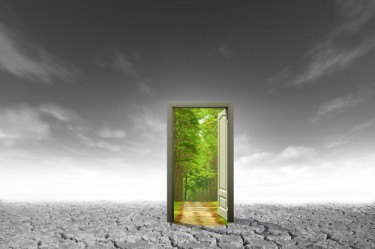
The title of the Wikipedia entry for “Real life” differs from its disambiguation page “Real Life” through the absence of one capital letter. But while the “Real Life” (upper case) page will lead you to many films and books and songs of that name, the “Real life” entry affirms, alas, that there is only one real life. “Real life.” The topic is abstract, speculative, and possibly even redundant. (Since when, after all, was life ever un-real?) Still, as the extensive entry for “In Real Life” shows us, we have more sure things to say about reality television than we do about “real life.” Turn off the television for a moment and let’s face it: who really knows about “real life”? How do a handful of people online begin to define it?
Interestingly, the entry (in its current incarnation) is not so much about “real life” than our anxiety that we’re never living it. The opening sentence attempts to mark the limits between reality and fantasy.

It’s difficult, though, to imagine that those so committed to spending time writing and revising a Wikipedia article on “real life” would deem such acts as lying outside it. As I, for example, sit combing through rejected versions of the entry, I refuse to categorize this experience as anything but the hyper-realism that defines another day in front of my computer screen. As we shall see, meticulously defining and policing entries on a reference site isn’t just an over-analytic impulse, or a niche of geek culture — this is culture as the wired world currently knows and lives it. Real life is less and less “an actual event or life” of physical exertion and bodily closeness — “meatspace,” as it’s sometimes called. People have always lived meaningful moments of their lives through stories; in the 19th century, such lives were largely experienced through the novel and its attendant technology of the book, though there are other narratives and mediums to absorb now. So if you, like me, cultivate fairly profound attachments through various technological objects, maybe the anxiety isn’t always “this is real life,” but “which life is more real?”
WHEN DID REAL LIFE BEGIN?
Here’s a history of “real life” as Wikipedia knows it. The user Llywrch who initiated the page anticipates its very impossibility:

Perhaps, though, he wanted the entry as a clearer way to define his own life. The first sentence of his user page refers back to it:

Personal incentives aside, that was 2003 (June 1, to be exact) and the entry we’re looking at today is from today: 2012 July 18. This is how we delineate life as we know it right now. The last update was from eight days ago. Onward.
This is what the entry for “real life” looked like in June 2003:
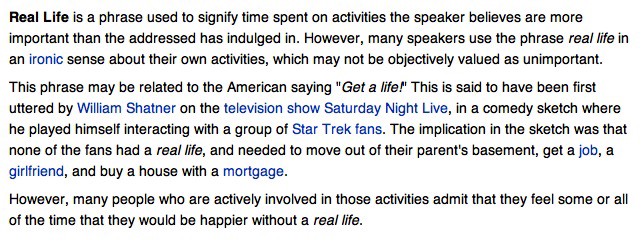
Notice that both Real and Life are capitalized (the “Real Life” entry would not appear until the next year). As expected, the entry has changed some since then. Life (as we know it) has changed since then. Still, the basic elements are there. As with all Wikipedia pages, one has to start from something, and that something will never, ever be objective, try as you might. As though grasping at legitimacy, a literary reference to “real life” was included on 13 March 2006:

Once added, it hasn’t been deleted once (unlike, say, sections on “Christianity” and “real life” — I expect that one to be resurrected repeatedly). I doubt a line from Dostoyevsky’s The Idiot is the first, or even best, instance of the kind of “real life” the page is interrogating, but here we are today:

Often, traces of a page’s earliest editions can be discerned in its, as yet, current form. To give any online user the intellectual freedom to edit such a widely acknowledged reference site remains to my mind radically liberating and democratizing, but also downright frightening when you think of the stock people place in Wikipedia authority.
THE IRONY OF REAL LIFE
Editor Llywrch writes: “many speakers use the phrase real life in an ironic sense about their own activities, which may not be objectively valued as unimportant.” This placement of real life in the context of irony seems integral to understanding the phrase. Read the entry as it is today; one can’t help but note its ironic tenor. If you read it in your most objective tone, it won’t sound objective; it will sound like it’s making fun of you.
“Real life” is sometimes a controversial term, describing “productive” activities, such as working, in contrast to “unproductive” (leisure) activities. Outside of fictional worlds, the phrase is often used to compare a more traditional way of living against a pejoratively depicted existence, such as academic life, in a manner similar to the term “real world”.
The aggressive use of quotation marks (lacking in the first years of the page’s life) do not help. When you use “quotation marks” that much, it no longer functions as a bracket specifying a particular word under definition. It “sounds” like you are “distancing” yourself from words (and more likely phrases or sentences) by being generally “ironic” or “sassy.”
There were those who sincerely objected to having a “real life” page:


Some cared enough to want it deleted:

But not enough:

If the need to define “real life” is internet-related — is as-opposed-to-internet-existence — then the internet won that tussle.

In keeping the page around, the internet was making a statement.

GEEKS, REAL LIFE AND MEATSPACE
The earliest entry suggests that “real life” might be related to William Shatner’s “Get a life!” shouted at Star Trek fans on a “Saturday Night Live” skit. This interpretation isn’t wrong, but the relation is probably less specific and more symptomatic of an entire culture that deems “geeks,” like Star Trek fans, as not “having a (real) life.” As, indeed, perhaps not even capable of “Getting a real life,” as though life is something to be “got.”
The most-visited day for the entry, by a mile, is currently December 7, 2010:
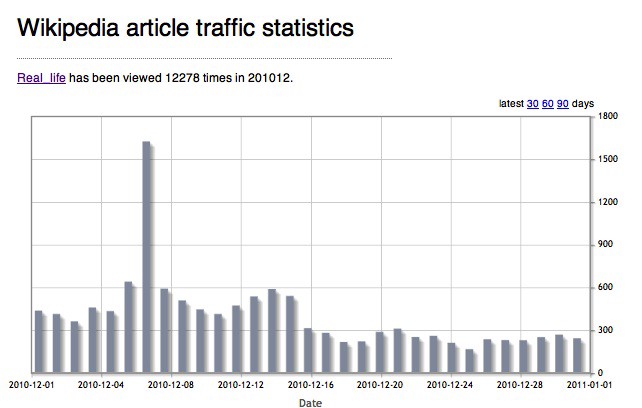
It’s intriguing to note that this is also the date Julian Assange of WikiLeaks was refused bail. At court, Assange failed to submit a real life address, submitting first a post office box number and then “Parkville, Victoria, Australia.” As his Wikipedia entry notes, “His lack of permanent address and nomadic lifestyle were cited by the judge as factors in denying bail.” Assange perhaps was so caught up moving online data into “real life” effects, that he forgot to make that link in his own life. Who knows though; maybe we could try to crowdsource why December 7th, 2010, received such a hit?
There is a relatively yawning gap between 24 December 2003 and 20 March 2004 where the page was left unedited. The changes that came when they did, however, were significant. Not only did they continue the scifi/geek trend (importantly so), the effects of these changes are largely what define the entry today (perhaps rightly so). March 20, 2004:

While the use of “meatspace” was erased a few times during the way, by August 13th, 2011, its description had been expanded to the version we see today:
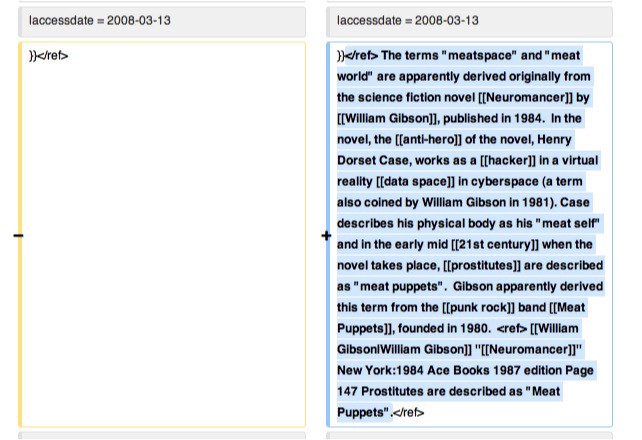
So much new information! And unlike the rest of the page, so specific. Burrow into the internet a bit more, and this “meat space” addition can be attributed to a 2005 March 2 MetaFilter (or MeFi) thread. MeFi — founded in 1999 — precedes Wiki by three years. Often, Metafilter threads read like a “View History” page on Wikipedia, but with more narrative and less back-tracking.
In the Metafilter thread, users link “meatspace” back to William Gibson’s now-canonical 1984 cyberpunk novel Neuromancer. While readers confirm that “meat” constantly appears in the novel to describe the fleshy-in-real-life world, “meatspace” never does. The convergence, however, still seems significant, and 1984 is still the earliest known mention of “meat” as in this anti-cyber context. Considering that Gibson coined “cyberspace,” it is at least poetically appropriate to also tag him to the origins of “meatspace.”
The Metafilter group begins, as any group of good researchers might, with the OED. Unlike the “real life” page (“meatspace” doesn’t have its own Wikipedia page yet), the OED “meatspace” entry hasn’t changed since 2000: it earliest citation for “meatspace” is still a 1995 Seattle Times article.
In this sagebrush ranch town where the elevation is about eight times the population, John Perry Barlow is multitasking between cyberspace, meatspace and parentspace about as well as a mere mortal can do.
By referencing the earliest use of “meatspace” from an online archive, the OED in essence admits that it cannot yet discern the earliest reference of the word. The internet is too vast, and changes too quickly. There is a reason that the OED — online or not — prefers its “evidence drawn from print publications.” A printed book doesn’t morph content with time — it cannot be deleted. The OED again:
Many correspondents seem to regard getting a word into ‘the dictionary’ as a sure route to fame and even fortune. They are often disappointed to hear that the process of adding any new word, or a new sense of an existing word, is long and painstaking, and depends on the accumulation of a large body of published (preferably printed) citations showing the word in actual use over a period of at least ten years. Once a word is added to the OED it is never removed; OED provides a permanent record of its place in the language.
If we associate “real life” with the non-online, then for the OED, real life is the anti-speculative. Unlike the OED, however, places like Metafilter and Wikipedia are as much about speculation as they are about trying to provide readers with a “permanent record,” and endlessly sprawling archive. While a Wikipedia page always tries to present its current version as the final and most authoritative one, its View History, like a Metafilter thread, spreads this process across time. A Wikipedia page is always in the process of becoming. An excavation of a Wikipedia article is concerned with the past, but I’d hazard to say that the writing of one is almost always about the future — even when focused on retelling the past. Wikipedia, like all archives, is about the prolongation of time.
“Meatspace” might initially seem a vulgar, even dismissive, expression for what amounts to the face-to-face confrontations that we usually associate with intimacy, but it’s actually a pretty apt description of the IRL space so subjected to the passage of time. Meat rots. The meat of cyberspace — as we’ve seen especially via Wikipedia — doesn’t so much decay or dwindle, than expand and accumulate over time. This might finally amount to a different kind of rot, though we couldn’t say what right now. As a fridge, the internet is far too expansive — both sophisticated and messy. Things will get lost, turned up and recycled elsewhere.
It makes sense that “in real life” sounds like a derivative of “in real time,” the latter displacing the former as a means to experience the Real through the context of the unreal internet. Further, the phrase “face time,” which precedes the internet, was used to describe interactions that weren’t just face-to-face, but interpersonally meaningful. One would (to use an internetish phrase) “log in” face time as a way of making up for being apart. Like “face time,” “real time” is a legitimizing construct. It is where supposedly profound — otherwise unachievable — closeness happens. But if you can’t experience life “in real time” “out there,” you could give it a whirl “in here,” online, with the rest of us.
Related: Case History Of A Wikipedia Page: Nabokov’s ‘Lolita’
Jane Hu lives in real life. Photo by basketman23, via Shutterstock.
Noodle-Making Robot Makes Noodles, Is Robot
“More importantly I don’t need to pay him, and for a consecutive work of 12 hours it only consumes 3 kWh of electricity. And the noodles it slices are even thinner than those of human workers.”
— Restaurant owner Qian Hu is talking about his noodle-making robot, but soon people will be able to say something similar about pretty much every occupation.
The CDs You'll Never Be Able To Get Rid Of
How many of these artists are represented in your collection?
Happy Grandmas Use Facebook
The Internet will keep you from being depressed, but you have to be old.
Molly Ringwald: Where Rap Music And Jewish Literature Meet
Above, a video that Adidas made at a recent recording session with Detroit rap star Danny Brown and Rhode Island-born producer Araabmuzik. They’re recording a song called “Molly Ringwald,” named for the beloved star of “The Facts of Life” and so many John Hughes movies in the ’80s. (And also probably sort-of for ecstasy, which is increasingly known as “molly” in hip-hop circles.) It came out good. And Molly Ringwald will be narrating the audiobook version of Awl pal Jami Attenberg’s forthcoming novel, The Middlesteins — which Kirkus recently declared a “sharp-tongued, sweet-natured masterpiece of Jewish family life.”
A Letter from the Theater Community Regarding David Adjmi's "3-C"
by Jon Robin Baitz

On June 6th, David Adjmi’s play 3-C opened Off-Broadway, and the same day, he received a cease-and-desist letter. Without legal counsel, he felt compelled to agree that the run of the play could not be extended — and that it would never be performed again. In this open letter, a group of playwrights, theater professionals and performers explain why this is so wrong.
Playwright David Adjmi, whose play 3-C just closed a run at Rattlestick Theatre, has received a threatening “Protest Letter” from the law firm of Kenyon & Kenyon, which represents DLT Entertainment, the owners of the long defunct TV sitcom “Three’s Company.” The letter accuses him of copyright infringement, and demands that he cease further performances of the play, provide them with an accounting of all revenues from the play to date, and furnish them with his written assurance that he will comply with these demands. The letter claims that 3-C damages their client’s property, which is being developed for the stage. In comparing the works, the lawyers note that “Connie is sexy and jiggles just like Chrissy,” Mr. Wicker makes gay jokes, as did Mr. Roper, and notes further that the play features slapstick comedy, which apparently is the sole property of “Three’s Company.” It goes on listing the similarities between the works. Yes, David’s play satirically invokes the sitcom in question as a template upon which to de-construct the mores and tropes of that time. It is clearly and patently and unremittingly parody, to the extent that it depends on Three’s Company’s 1970s attitudes towards sexual relations, etc., in order to slyly examine the underlying brutality and bigotry attendant to American popular culture of that era. (And since then).The critical response to the play has generally acknowledged 3-C’s exploration of the essential aloneness of the characters, and the toxic suffering they endure. Mr Adjmi’s intentions are not to replicate Three’s Company, but clearly and patently to mutate it into something dark and frightening, savage even.
Parody has been recognized as protected speech by the Supreme Court again and again. (Think of the highly publicized case of Hustler Magazine Inc. v Jerry Falwell, in which the minister sued the magazine publisher over a mock Campari ad in which he was portrayed as having a drunken sexual encounter with his mother in an outhouse. I could go on and on, listing such examples, some more outré, some less.) To quote the First Amendment Center:
A parody is an attack on folly, but it takes the form of a contemptuous imitation of an existing artistic production — usually a serious work of literature, music, artwork or film — for satirical or humorous purposes. Satire and parody have served for generations as a means of criticizing public figures, exposing political injustice, communicating social ideologies, and pursuing such artistic ends as literary criticism. Satirists usually find themselves subjected in turn to criticism, contempt and, sometimes, lawsuits. The First Amendment protects parody as a form of free speech and expression.
I am not a lawyer, but David may need one, and I am currently investigating the willingness of a respected First Amendment firm to take this case on pro-bono. That an off-Broadway playwright should be bullied by a Wall Street law firm over a long-gone TV show, is, in and of itself, worthy of parody, but in fact, this should be taken seriously enough to merit raising our voices in support of Adjmi and his play, which Kenyon & Kenyon is insisting be placed in a drawer and never published or performed again. Whether one appreciates the work or not is immaterial; the principle at stake here is a basic one. Specious and spurious legal bullying of artists should be vigorously opposed, and that opposition must begin first and foremost with all of us in the New York Theatre community.
Sincerely,
Jon Robin Baitz
Andre Bishop (Artistic director, Lincoln Center Theatre)
Tony Kushner
Martha Plimpton
Joe Mantello
Stephen Sondheim
Terrence McNally
Kenneth Lonergan
John Guare
Chris Shinn
Pippin Parker
John Patrick Shanley
Jose Rivera
Craig Lucas
Peter Hedges
Jim Nicola (Artistic Director, NY Theatre Workshop)
Steven Karam
John Steppling
Alisa Solomon
Terry Kinney (co-founder, Steppenwolf Theatre Company)
Stephen Adley Guirgis
Kelly Overbey
Kevin Sessums
Daniel Goldfarb
Lou Jacob
Bruce Norris
Casey Childs
Ann Washburn
Mark Snyder
Isaac Butler
Julianne Hoffenberg
Nick Gandiello
Josh Beerman
Dorian Palumbo
Peter Frechette
Michele Volansky
Daniel Reitz
Nick Jones
Adam Feldman
Jenny Mudge
Chris Henry Coffey
Haskell King
James Joseph O’Neil
Laura Cole
Ellen Novack
(If you would like to become a signatory or lend assistance, inquire here.)
Magazine Writer Has Lots of Money
“My financial records revealed that I have way too much money in my checking account.”
— Former terrible New Republic blogger
and current New York and GQ contributor Jason Zengerle gets VP-vetted as a GQ stunt and the facts that emerge (okay, just that one fact) may surprise you. Also I guess he is prepared for the IRS to come at him over that whole “paying undocumented workers” and “not reporting income paid to household help” thing? Guess he won’t have trouble with the small fines.
[UPDATE: This is a dick post. It was supposed to be mildly amusing and to convey mostly friendly teasing, and instead it came out DICKISH and MEAN and HOSTILE, quite unnecessarily. I will leave it all here intact, instead of deleting it, as a memorial to when I am wrong. Once again, we meet the problem of conveying tone on the Internet. My apologies for misfiring to Mr. Z.]
What's The Best Car Gear For A Roadtrip?
What’s The Best Car Gear For A Roadtrip?
by Brian Lam

Summers are filled with road trips and road trips are about junk food pit stops, managing gas station bathroom filth and also the car itself. For some reason, every time I get a car, I begin to fill it with lots of extra little things that I imagine might come in useful in a pinch a far ways from the safety of home. I suppose that’s how I ended up with an old VW Vanagon camper van with a tricked-out electrical system, closets, stove, and two full-sized beds. It’s a special feeling of freedom combined with creature comforts when I take my van on a trip across the Western American ranges.
Most car gadgets are useless little toys. Like the solar window fan that blew no more cool air than a gentle cross breeze would. And the little 12v chilling/heating coolers. They don’t work.
But I do have some favorite car gadgets.

My favorite thing so far are these sheepskin seat covers, which are like the ones my dad used to have on his old Mercedes station wagon. Wool is an amazing material. Its insulation qualities allow it to stay warm in the winter and cool in the summer. And wool is non-porous, so it’s super easy to clean if you spill a slurpee on these seats. I personally own these and they’re high quality, except the back strap is a little flimsy. I still like them.
Eventually, you will have to change a tire. Sometimes at night. I have, in every car, a headlamp so I can change a tire with both hands free, or find a good spot in the woods to pee.

I also recommend stowing a pair of gloves in the car to keep your hands clean and warm during the process. Five-dollar utility gloves from a hardware store are good, but I have had these old deerskin motorcycle gloves in my car for a decade, and I love them. It’s also nice to have a cheap rain jacket in your car for emergencies and for sudden downpours. This jacket by Marmot is $55, a great everyday value, and I like it as much as the more expensive gore-tex jackets we rain- and shower-tested.
Speaking of emergencies, it’s not even close to being a piece of gear but you should have an AAA membership if you do any sort of driving at all.
There’s no such thing as a road trip without music.
I haven’t verified it to be the best around but it’s good enough that I bought two generations of this Pioneer radio, which is perfect if you have an iPhone or other smartphone because it has a USB charging port in the front that can also play music from any App (with an app mode that lets you still use the touchscreen controls and not just the buttons on the radio). It also has bluetooth and a microphone for calls.

(If your car has no way to hook up a phone or MP3 player to play music, I like this FM transmitter.)
Here’s a 10-foot long iPhone cable that I use to let people in the back seat DJ and charge their phones.
I use the music streaming service RDIO, which is like Spotify but with a better user interface. I also have a set of castanets in the van. I should really get some maracas too before my next baja trip.

Sunglasses — I like these aviators but I do not make any claims to them being the best. I just use them religiously.

Those with heavier feet will want to consider a radar detector. Here are our two favorites, which aren’t cheap but are cheaper than speeding tickets.
I also like this solar gadget charging battery pack, which is useful if you are car camping.

And to remember everything on film, here’s my favorite instant camera: the Fujifilm Instax 210.
I also have a pair of these binoculars in my van for spotting waves along California Highway 1.
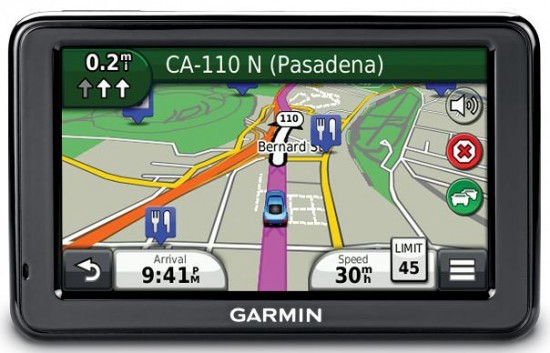
And if you need a GPS, this Garmin model is my favorite one because it’s not too expensive at $200 and can be voice controlled.
Lastly, I think the only time I get suckered into paying for plastic bottles of water is on road trips. Recently, I’ve started carrying a water bottle like this to avoid paying for tap water and making more waste.
Related: What Are The Best Audiobooks For A Roadtrip?
Sponsored posts are purely editorial content that we are pleased to have presented by a participating sponsor, advertisers do not produce the content. This post is brought to you by NEW Armor All Extreme Shield Wax. Help keep your car looking as good as the day you bought it with Armor All. Go to Facebook.com/ArmorAll for a $10 rebate.
Brian Lam is the editor of The Wirecutter.
Slouching Towards The Toyota Center
What do Jeremy Lin and Joan Didion have in common? Someone needed a post.
